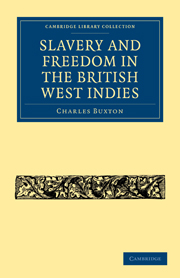Book contents
SLAVERY AND FREEDOM IN THE BRITISH WEST INDIES
Published online by Cambridge University Press: 28 February 2011
Summary
A hundred years ago, when black men were seldom seen north of the Tweed, an old Scotch gentlewoman, meeting a negro in the street, cast up her eyes and hands, exclaiming, “Hech, sirs, what canna be made for the penny!” And well might the British people do the same. At a cost, not of one penny, but of five thousand million pennies, we have produced that curious specimen of the human race, the free negro of the West Indies. Such was the outlay. Now, what is the result? What sort of thing have we got for our money? Was that a wise investment of capital?
The reply of some high authorities has been given, and is this—Our islands, they say, the richest and loveliest in the world, are fallen from wealth to ruin; crumbling, deserted, desolate towns; empty harbours; trade gone; agriculture at death's door; the old staples vanished away. The owners of these once fertile lands languishing in poverty, or dead of broken hearts. The negroes, for whom all was done, “sunk up to the ears in pumpkin,” growing every day more savage, more idle, more beastly. Such, they tell us, is the work that our philanthropy has worked out under the sun. Is that so, or is it not so? The subject deserves some thought. England's giving freedom to her slaves was an act unique in the history of man. We know not where an example can be found of so noble a sacrifice, made by a whole people.
- Type
- Chapter
- Information
- Slavery and Freedom in the British West Indies , pp. 1 - 92Publisher: Cambridge University PressPrint publication year: 2010

